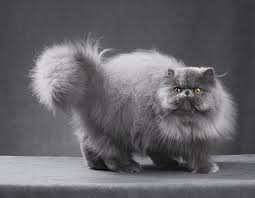
Persian
Conditions of detention
Persian cats thrive in calm and comfortable indoor environments where they can feel secure and part of the family. They enjoy cozy spots to relax and benefit from regular grooming sessions.
Useful Fact:
Persians are known for their gentle and laid-back nature. They enjoy companionship and will often seek out their owners for attention and cuddles, making them excellent companions for those looking for a loving pet.
Nutrition and diet
Persian cats benefit from a balanced diet that supports their overall health and maintains their beautiful coat. High-quality commercial cat food, rich in protein and omega fatty acids, is ideal. Special formulas designed for long-haired breeds can help reduce hairballs.
Useful Fact: Persians have a tendency to overeat, so portion control is important to prevent obesity.
Health
Persians are prone to specific health issues such as polycystic kidney disease (PKD), respiratory problems due to their flat faces, and dental issues. Regular veterinary check-ups are essential to monitor and manage these conditions.
Useful Fact: Genetic testing is available for PKD, allowing breeders to reduce the incidence of this disease.
Grooming and care
Persians require daily grooming to prevent their long fur from matting and to control shedding. Regular bathing, at least once a month, helps keep their coat clean and free from oils and dirt.
Useful Fact: Grooming sessions also provide an opportunity to check for skin issues or parasites.
Education and training
Persians are intelligent but may be less motivated than other breeds. Patience and positive reinforcement, such as treats and praise, work best when training them to follow commands or use a litter box.
Useful Fact: Early socialization and training help Persians become well-adjusted pets.
Toys and entertainment
While Persians are not the most active breed, they do enjoy interactive toys and gentle play. Puzzle feeders and soft toys can provide mental stimulation and keep them entertained.
Useful Fact: Persians prefer calm and quiet environments, so avoid overly stimulating or noisy toys.
Safety
Persians should be kept indoors to protect them from outdoor hazards like traffic and predators. Ensure your home is cat-proofed by securing windows and keeping harmful substances out of reach.
Useful Fact: Due to their flat faces, Persians can have difficulty breathing in extreme heat, so keep them in a cool environment.
Accessories
Provide your Persian with essential accessories such as a comfortable bed, scratching posts, and a spacious litter box. High-sided litter boxes can help contain litter and reduce mess.
Useful Fact: Elevated food and water dishes can make it easier for Persians to eat and drink comfortably.
Socialization
Persians are social and enjoy the company of their human family and other pets. Early and gentle socialization helps them develop into friendly and well-mannered cats.
Useful Fact: Persians tend to form strong bonds with their owners and may prefer their company over that of strangers.
Travel and Transportation
Use a sturdy, comfortable carrier when traveling with your Persian. Familiarize them with the carrier beforehand to reduce travel anxiety.
Useful Fact: Place a familiar blanket or toy in the carrier to provide comfort during trips.
Behavior and psychology
Persians are known for their calm and gentle nature. They thrive in a stable, peaceful environment and may become stressed by loud noises or sudden changes.
Useful Fact: Providing a quiet, safe space for your Persian can help them feel secure and reduce stress.
Legal aspects
If you plan to breed or show your Persian, ensure they are registered with a reputable cat registry. Follow local regulations regarding pet ownership, including vaccinations and licensing.
Useful Fact: Some regions have specific regulations for breeding or showing cats, so it’s important to stay informed and compliant with local laws.


